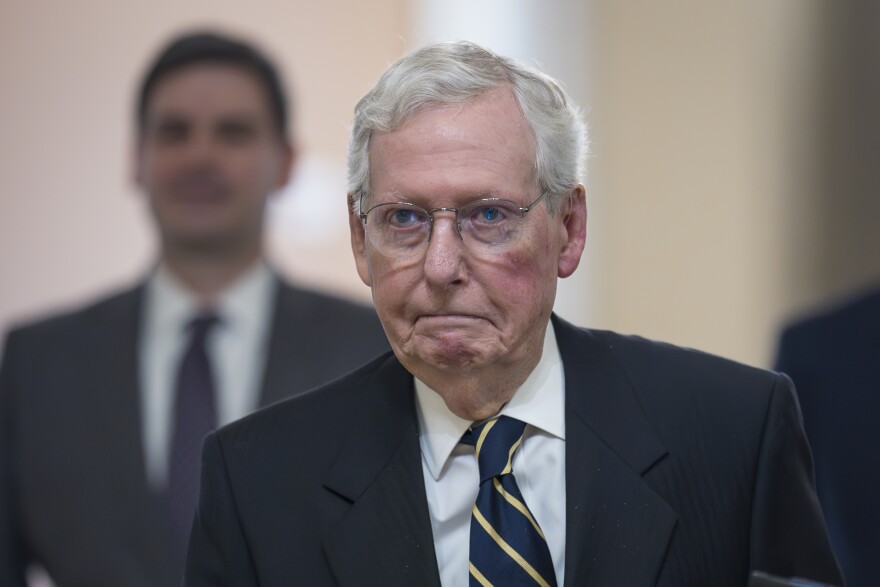Mitch McConnell is free.
Not even Donald Trump, with all the tools of retribution he has at hand to punish political foes, can touch him now.
His seventh six-year term in the Senate is up next year. And although he hasn’t said he will retire, Kentucky Republicans don’t expect him to run again, and potential successors are starting to line up for his seat.
No matter what he decides to do, the senior senator from Kentucky — who turns 83 years old next Thursday — has been stretching his wings since Trump was sworn in last month, breaking with the very Trump-ish GOP majority in the Senate and voting against the president on three of his most controversial cabinet nominees.
But McConnell doesn’t seem to have tried to bring some of the GOP senators he led for many years to vote with him.
As of late Thursday morning, all three of the cabinet members opposed by McConnell — Robert F. Kennedy Jr., Tulsi Gabbard and Pete Hegseth — have been confirmed by the Senate. In the cases of RFK and Gabbard, McConnell was the lone "no" vote on the Republican side. (On Hegseth, Sens. Lisa Murkowski of Alaska and Susan Collins of Maine also voted no.)
McConnell — who spent 12 years as Senate minority leader and six as majority leader — has unquestionably had a rocky relationship with Trump.
That was clear in February 2021, when McConnell made a fiery speech on the Senate floor saying Trump was “morally responsible” for unleashing the Jan. 6 assault on the Capitol.
And last month, the Republican National Committee passed a resolution censuring two GOP House members who were part of the committee investigating the Jan. 6 riot, saying Liz Cheney and Adam Kinzinger helped lead the “persecution of ordinary citizens engaged in legitimate political discourse.”
McConnell was having none of it.
“It was a violent insurrection for the purpose of trying to prevent the peaceful transfer of power after a legitimately certified election from one administration to the next,” McConnell said of what happened at the Capitol that day.
But when Trump was impeached on charges relating to Jan. 6, McConnell voted to acquit.
McConnell also has been critical of Trump’s tariff plans, saying tariffs could harm Kentucky businesses such as the bourbon distilleries and auto plants.
But McConnell has left his biggest mark on this Senate session so far due to his votes on Trump's controversial cabinet nominees. He simply couldn’t go along with Trump on people he believed were not qualified for the jobs.
McConnell was one of three Senate Republicans to vote against former Fox News personality Pete Hegseth for Secretary of Defense, a National Guard veteran who faced credible allegations of drunkenness and sexual abuse and was confirmed in a vote where Vice President JD Vance had to break a tie.
He clearly didn’t think Hegseth was prepared for what may well be the most important job in government, and he said as much.
“The United States faces coordinated aggression from adversaries bent on shattering the order underpinning American security and prosperity,” McConnell said in a statement. "In public comments and testimony before the Armed Services Committee, Mr. Hegseth did not reckon with this reality.”
He was the only Republican to vote earlier this week against Tulsi Gabbard, who was confirmed as Trump’s Director of National Intelligence, despite her reputation as being sympathetic to Russian interests.
Gabbard, in her Senate confirmation hearings, repeatedly refused to answer questions from Democratic senators on whether or not she considered Edward Snowden a traitor to the U.S.
Snowden, a former contractor for the National Security Agency, fled to Russia after turning over top secret intelligence to Putin’s government.
After the vote on Gabbard’s nomination, McConnell had plenty to say.
“The nation should not have to worry that the intelligence assessments the President receives are tainted by a Director of National Intelligence with a history of alarming lapses in judgment,” McConnell said in a written statement.
“Edward Snowden’s treasonous betrayal of the United States and its most sensitive lawful intelligence activities endangered sources, methods, and lives,” he wrote.
There had been much speculation about how McConnell will vote on what might be the most controversial nominee of them all — anti-vaxxer Robert F. Kennedy for secretary of Health and Human Services.
Kennedy was grilled by Democratic senators mercilessly for his views on vaccines. He has said, for example, that polio vaccines caused more deaths than they prevented — a totally unfounded position — as is his oft-stated contention that autism is linked to vaccines.
Thursday morning, McConnell was the only Republican who voted against Kennedy’s confirmation.
“I'm a survivor of childhood polio,” McConnell said in a written statement after the vote. “In my lifetime, I've watched vaccines save millions of lives from devastating diseases across America and around the world.
“Individuals, parents, and families have a right to push for a healthier nation and demand the best possible scientific guidance on preventing and treating illness,” he went on to say. “But a record of trafficking in dangerous conspiracy theories and eroding trust in public health institutions does not entitle Mr. Kennedy to lead these important efforts.”
The only question about McConnell’s new-found liberation from doing Trump’s bidding is this: Why, if he believed Hegseth, Gabbard and Kennedy were terrible choices by Trump and unfit for high office, didn’t he say so before the Senate floor vote?
Had he done that, maybe his senior status in the GOP caucus might have created a permission-structure that would have encouraged a few of his Republican colleagues to also vote “no” on these three.
But maybe he doesn’t feel all that liberated, after all.
Read more:




